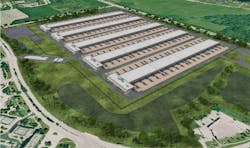Suburban Chicago Welcomes Compass Datacenters' Major Hyperscale Development on Legacy Sears HQ Site
In a ceremony on June 13 in Suburban Chicago, Compass Datacenters, alongside its partners from the Village of Hoffman Estates and power utility ComEd, celebrated the start of work to transform the former Sears Headquarters site into a hyperscale data center campus.
Compass plans to build five hyperscale data centers on the approximately 200-acre campus site.
Per a Compass press release, once the campus becomes operational, the project will represent approximately $10 billion in local investment.
Construction of the campus will generate 1,000 local jobs, said the company.
Background and Progress Update
The future of Sears’ expansive, seven-building campus had been in question since the previous owner filed for bankruptcy in 2018.
Circumstances made finding a new owner challenging. Lack of demand for office space following the pandemic, when much of the populace started working from home and did not return to traditional offices, affected the site's saleability.
The Dallas-based hyperscale data center developer closed on the site in September 2023 and began creating plans to transform the space. Compass Datacenters CEO Chris Crosby spoke about the site's progress.
“At Compass, we go slow before we go fast,” he said. “We’re taking a methodical approach to demolition and doing all we can to minimize waste. It will take over a year to complete this work, setting the stage for Compass to do what it does best – building sustainably and building to last.”
Sustainability at the Old Sears HQ
Per a company statement, since Compass Datacenters' closing on the sale transaction, business and nonprofit groups have had access to the site to repurpose equipment, furniture and other supplies.
First responders have also used the buildings for training while Compass worked with Hoffman Estates on plans for development.
“We are very pleased to welcome Compass Datacenters to Hoffman Estates. The redevelopment of the former Sears headquarters into a data center campus begins a new chapter for this high-profile property and continues the technology diversification of our tax base,” said Mayor William McLeod, the Village of Hoffman Estates. “Although still preliminary, the investment by Compass will be in the billions of dollars and will have positive effects for our community for years to come.”
Now, the site is being readied for structural demolition which will commence this summer, with construction slated to begin next year.
Compass Datacenters noted that, as the old buildings come down, concrete, stone blocks and asphalt from the existing site will be repurposed as fill to make the refurbished site even and as aggregate in concrete production.
Compass stated that it "uses an artificial intelligence application to help optimize these types of locally available materials for concrete production to reduce greenhouse gas emissions."
Compass Datacenters emphasizes that its buildings are constructed using modular designs - which means many of the components are prefabricated offsite and then assembled onsite in a streamlined fashion.
This construction method allows for rapid building, and also provides numerous safety benefits for local crews, contends Compass.
Local View
In local news coverage, the Chicago Sun-Times' Abby Miller noted that the 197-acre campus from Compass will yield one of the 10 largest data centers in Illinois in addition to being Compass’ first data center campus in the state.
As further noted by Miller:
"Compass bought the site in September 2023 for $194 million. At the time, it remained tight-lipped about its use. It’s since announced plans to build five hyperscale data centers, each expected to span over 250,000 square feet. The development is projected to bring an estimated $10 billion in investment in the coming years, with the first data center expected to be powered by ComEd in mid-2026."
The Chicago Sun-Times' reporting additionally noted that ComEd helped secure 15 new commercial projects in the region last year, including nine data centers. The report said that Carol Stream’s American Demolition is currently completing select demolition at the site; and that demolition will take about 18 months, according to Compass, before construction can begin. The report stated that Compass anticipates starting construction in late 2025.
Market View
JLL's North America Data Center Report | H2 2023 report scoped a total inventory of 842.3 megawatts (MW) in the Chicago Data Centers market, with 74.4 MW vacancy. The firm discerned 635 MW under construction in the Chicago market, with 611.8 MW planned.
In terms of supply, JLL's report said that Chicago is very tight on capacity due to unprecedented leasing, while emphasizing "significant power constraints and limited available land for opportunities for new development in core submarkets."
JLL noted that projects including T5, Prime, NTT, CyrusOne, CloudHQ, Aligned and Edged Energy will deliver in 2025 and 2026. However, the commercial real estate services firm noted that most of these facilities are expected to be fully preleased when they become available.
In terms of demand, JLL's report found that "significant demand for large-scale campuses with near-term power delivery in 2024 or 2025 is at an all-time high across the country."
JLL reckons that new Generative AI requirements are looking for 300+ MW campuses, and that the technology's "location-agnostic parameters are pushing the geographic boundaries of where data centers have typically been willing to go."
As such, in terms of major market trends, JLL reported Chicago as seeing strong absorption in early 2024 across existing and planned data centers.
Consequently, JLL predicts that new projects in unforeseen areas of Suburban Chicago will emerge as a play for AI requirements.
The firm forecasted that the Chicago Data Centers market will "face continued headwinds due to power constraints, difficulty building in core areas and labor costs."
"Other markets with power and more plentiful land pose a major threat to take business," added JLL's report.
Notes on Adaptive Reuse
In particular counterpoint to the sustainability credentials of the new Compass Datacenters' development in Suburban Chicago, in a recent Data Center Frontier "Voices of the Industry" essay, Sean Farney, Vice President of Data Center Strategy for the Americas at JLL, explored such adaptive reuse of legacy real estate as a bona fide sustainability strategy - while explaining his key contention that "it's time to gamify circularity" on such sites with the awarding of carbon accounting credits.
"With sustainability becoming increasingly important, redeveloping older buildings can be a powerful way to reduce a building’s carbon footprint and meet mounting demand for new data centers," writes Farney.
He adds: "Our throwaway culture has led the industry to believe that newness is better, but that’s not always true. As we've quietly taken adaptive reuse off the table in the interest of perceived risk and speed, we've added massively to environmental impact, chiefly in the form of concrete and steel embodied carbon."
JLL's Farney concludes:
"With a circular mindset, any commercial building with the right bones and sufficient power supply can be transformed into a data center ... Given the immense potential of adaptive reuse, why does it continue to be such a missed opportunity? I believe it’s because we lack a true line of sight into the carbon savings of adaptive reuse and, therefore, incentive."
"I propose we measure both the embodied carbon used in the original construction and the embodied carbon avoided in not building new. That includes not just concrete and steel but the entire construction value chain: manufacturing, shipping, installation, building and even the act of not paving over a new site."
"Armed with these numbers, we need to gamify adaptive reuse — just like how introducing power usage effectiveness (PUE) brought sustainability competition to the industry. Imagine how behavior would change if we issued a carbon accounting credit to companies that make the circular choice to recycle a building?"
About the Author
Matt Vincent
A B2B technology journalist and editor with more than two decades of experience, Matt Vincent is Editor in Chief of Data Center Frontier.



